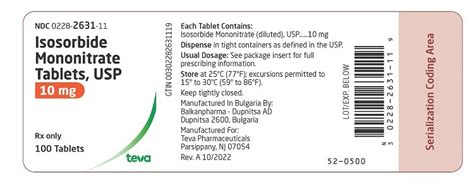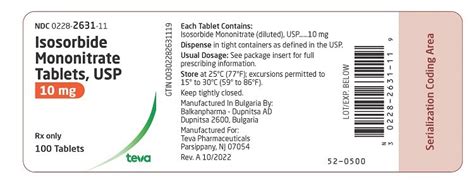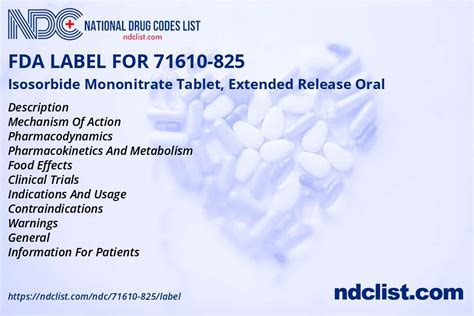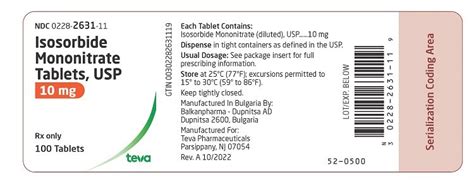Intro
Discover Isosorbide Mononitrate side effects, including headaches, dizziness, and low blood pressure. Learn about dosage, interactions, and warnings to manage angina symptoms safely.
Isosorbide mononitrate is a medication commonly used to treat angina pectoris, a condition characterized by chest pain or discomfort due to coronary heart disease. It belongs to a class of drugs known as nitrates, which work by relaxing and widening blood vessels to improve blood flow to the heart. While isosorbide mononitrate is effective in managing angina symptoms, it can cause a range of side effects, some of which can be severe. Understanding these side effects is crucial for patients to make informed decisions about their treatment and to minimize potential risks.
The importance of being aware of the side effects of isosorbide mononitrate cannot be overstated. Patients who are well-informed about what to expect from their medication are better equipped to manage their condition and to seek medical help when necessary. Furthermore, recognizing the signs of adverse reactions can help prevent more serious complications from developing. In this article, we will delve into the various side effects associated with isosorbide mononitrate, exploring their causes, symptoms, and management strategies. By providing a comprehensive overview of these topics, we aim to empower patients and healthcare providers with the knowledge needed to optimize treatment outcomes and ensure safe use of this medication.
Isosorbide mononitrate, like other nitrates, can cause a variety of side effects due to its mechanism of action. The dilation of blood vessels leads to decreased blood pressure, which can result in symptoms such as headache, dizziness, and lightheadedness. These effects are generally mild and transient but can be bothersome for some patients. More severe side effects, including hypotension (low blood pressure), can occur, particularly when the medication is first started or when the dose is increased. It is essential for patients to understand how to manage these side effects and when to seek medical attention if they experience any unusual or severe reactions.
Common Side Effects of Isosorbide Mononitrate

The most common side effects of isosorbide mononitrate include headache, dizziness, lightheadedness, and nausea. These symptoms are usually mild and may diminish as the body adjusts to the medication. However, if they persist or worsen, patients should consult their healthcare provider for advice. Other common side effects can include flushing of the skin, rash, and diarrhea. It is crucial for patients to discuss any side effects they are experiencing with their healthcare provider to determine the best course of action.
Less Common but Serious Side Effects
In addition to the common side effects, isosorbide mononitrate can cause less common but more serious adverse reactions. These include severe hypotension, which can lead to fainting or even heart attack if not promptly addressed. Patients should be aware of the signs of hypotension, such as severe dizziness or fainting, and seek immediate medical help if they experience these symptoms. Other serious side effects can include methemoglobinemia, a condition characterized by an abnormal amount of methemoglobin in the blood, which can lead to symptoms like cyanosis (blue discoloration of the skin), headache, and dizziness.Managing Side Effects of Isosorbide Mononitrate

Managing the side effects of isosorbide mononitrate involves a combination of lifestyle adjustments, dose adjustments, and, in some cases, additional medications. Patients are advised to stand up slowly from a sitting or lying position to reduce the risk of dizziness and lightheadedness. Staying hydrated by drinking plenty of water can also help mitigate some side effects. If side effects are severe or bothersome, patients should discuss their concerns with their healthcare provider, who may adjust the dose or recommend alternative treatments. It is also important for patients to keep a record of their side effects and any changes in their condition to share with their healthcare provider.
Interactions with Other Medications
Isosorbide mononitrate can interact with other medications, including certain phosphodiesterase inhibitors (used to treat erectile dysfunction), riociguat (used to treat pulmonary arterial hypertension), and other nitrates. These interactions can increase the risk of severe hypotension and other adverse effects. Patients should inform their healthcare provider about all the medications they are taking, including over-the-counter drugs and supplements, to avoid potential drug interactions.Special Precautions and Warnings

Certain patients may require special precautions when taking isosorbide mononitrate. For example, individuals with a history of head trauma or cerebral hemorrhage should use the medication with caution due to the risk of increased intracranial pressure. Patients with severe anemia, hypovolemia, or hypotension should also be cautious, as isosorbide mononitrate can exacerbate these conditions. Additionally, the medication is not recommended for patients with certain heart conditions, such as constrictive pericarditis or restrictive cardiomyopathy, unless under close medical supervision.
Pregnancy and Breastfeeding
The safety of isosorbide mononitrate during pregnancy and breastfeeding is not well established. While there is limited data suggesting that nitrates may be used during pregnancy for certain conditions, isosorbide mononitrate should only be used if the potential benefits outweigh the risks. Breastfeeding mothers should also exercise caution, as it is not known whether isosorbide mononitrate passes into breast milk.Conclusion and Future Directions

In conclusion, while isosorbide mononitrate is an effective medication for managing angina, it can cause a range of side effects, from mild to severe. Understanding these side effects and taking steps to manage them can help patients optimize their treatment outcomes and minimize risks. As research continues to uncover more about the effects and interactions of isosorbide mononitrate, healthcare providers and patients must remain vigilant and proactive in managing this medication's use.
Final Thoughts
The journey to effective angina management involves a deep understanding of the medications used, including their benefits and potential drawbacks. By being informed and engaged, patients can work closely with their healthcare providers to find the best treatment strategies for their specific needs. Whether through medication adjustments, lifestyle changes, or a combination of both, the goal of minimizing side effects while maximizing the benefits of isosorbide mononitrate is achievable with the right approach.
We invite readers to share their experiences and questions about isosorbide mononitrate in the comments below. Your insights can help others navigate the complexities of managing angina and its treatment. Additionally, if you found this article informative, please consider sharing it with others who may benefit from this knowledge.
What are the most common side effects of isosorbide mononitrate?
+The most common side effects include headache, dizziness, lightheadedness, and nausea. These symptoms are usually mild and may diminish over time.
Can isosorbide mononitrate be used during pregnancy?
+The safety of isosorbide mononitrate during pregnancy is not well established. It should only be used if the potential benefits outweigh the risks, under the guidance of a healthcare provider.
How can I minimize the side effects of isosorbide mononitrate?
+Patients can minimize side effects by standing up slowly, staying hydrated, and discussing any concerns with their healthcare provider, who may adjust the dose or recommend alternative treatments.
